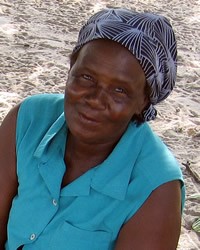Chopi in Mozambique

Photo Source:
Anonymous
|
Send Joshua Project a map of this people group.
|
| People Name: | Chopi |
| Country: | Mozambique |
| 10/40 Window: | No |
| Population: | 1,521,000 |
| World Population: | 1,521,000 |
| Primary Language: | Chopi |
| Primary Religion: | Ethnic Religions |
| Christian Adherents: | 35.00 % |
| Evangelicals: | 3.84 % |
| Scripture: | Complete Bible |
| Ministry Resources: | Yes |
| Jesus Film: | Yes |
| Audio Recordings: | Yes |
| People Cluster: | Bantu, Central-Southeast |
| Affinity Bloc: | Sub-Saharan Peoples |
| Progress Level: |
|
Introduction / History
The Chopi people speak a Bantu language, and the younger generation also speak Portuguese, the official language of Mozambique.
They are mainly located on the coast between Chidenguele in the province of Gaza and Inharimme in the province of Inhambane. The center of the Chopi people group is the Zavala district, and specifically the town of Quissico.
What Are Their Lives Like?
The Chopi generally live a life of subsistence agriculture growing staples such as cassava, corn, and peanuts, and they also fish. They eat what they grow and go to local markets to sell their produce and buy other things. Their stretch of the Mozambican coast has an abundance of coconut palms as well as many cashew trees. Many of the men work over the border in South Africa in the mines, leaving many households with several generations of women. The women work in the fields, take care of children, get water, cook, clean, and sell produce at the markets.
They are well-known for their use of the timbila instrument and their accompanying skill in traditional dance.
What Are Their Beliefs?
The majority of Chopis function under a traditional animistic belief system where local witchdoctors and healers have spiritual authority in the communities. Ancestors are worshipped and pacified when angered. Animal sacrifices are essential to obtain favor with spirits so that one may have good crops, health, peace, and success. Ropes, strings, and cords are also tied around the body under the clothes (especially at the neck and waist, and for babies also at the wrists) for spiritual protection and success.
There are also many Chopi that belong to the African independent church called Zione (locally mazione) which combines teachings of the Old Testament of the Bible and traditional rituals for purification, different forms of "baptisms" and demonic exorcism. The prophets where colorful robes and utilize spiritual objects that are said to contain power, such as special ropes and staffs. Most are polygamist and they do not eat pork.
There are a few Catholic and Protestant churches, but many of the church members would continue to function, at some level, under a traditional animistic belief system alongside their church practices.
What Are Their Needs?
The Chopi need to know that the Creator God is all-powerful and that He loves them. They need to truly and deeply understand his salvation in Christ and his victory over Satan, demons, and darkness. They, like all other people, need incarnational missionaries who enter in and dwell amongst them to be, do, and speak God's grace and truth in Christ Jesus.
Prayer Points
Pray for the Chopi elders and family leaders to place their faith in Christ rather than in the spirit world.
Pray for the Lord to do mighty miracles in their villages in such a way they cannot deny his sovereignty.
Pray for the Lord to give them a record-high yield as a testimony of his goodness and power.
Pray there will soon come a day when Chopi Christians will share Christ with others who remain gospel-starved.